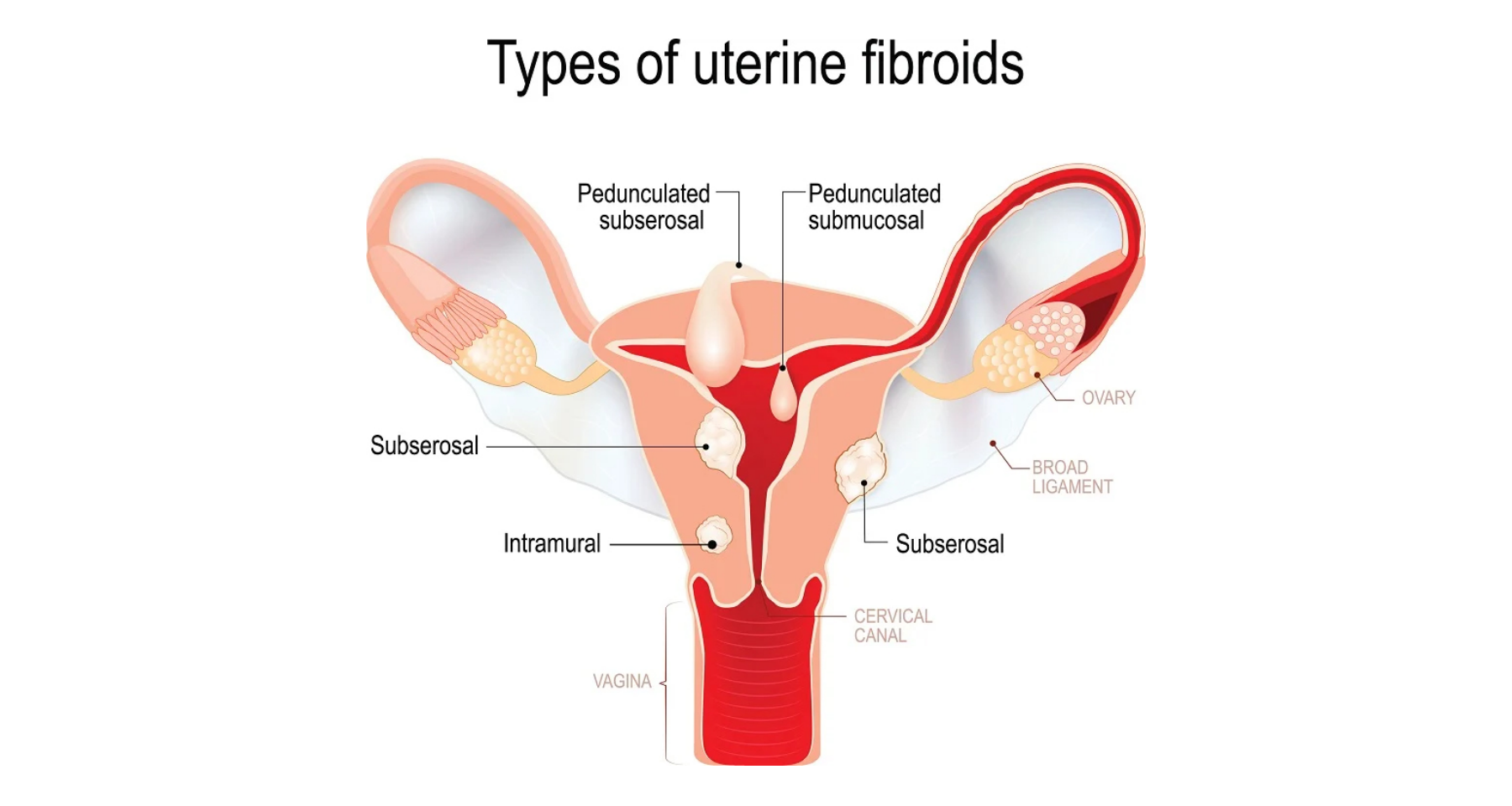The Expert Guide to Understanding Fibroids and Fibroid Treatments
A diagnosis of fibroids often comes as a surprise. Perhaps you went in for a routine pelvic exam and came out with a concerning diagnosis of fibroids. Or maybe you have been struggling with fertility, only to discover that a large fibroid is preventing conception. It’s natural to wonder if and how the fibroids will affect your fertility, how you can minimize symptoms, and what your treatment options are.
When faced with a diagnosis of uterine fibroids, understanding your treatment options is the first step toward recovery. Although there are various approaches, only a few offer a lasting solution that protects your fertility. With the guidance of an experienced fertility doctor, you can make an informed decision regarding the treatment of your fibroids. As you follow along, you’ll learn about:
Fibroids are tumors that grow along with the muscles of the uterine wall. They are almost always benign and can bulge into or out of the uterus, or remain within the uterine wall. Also known as leiomyoma or myoma, fibroids vary in appearance and presentation. Some are small, while others grow large, and sometimes only one fibroid grows, while other times several appear.
Fibroids are classified based on where they are located or how they are attached to the uterine wall:
- Intramural fibroids:These fibroids grow in the uterine wall muscle. They are the most common type of fibroid.
- Submucosal fibroids: These fibroids grow just under the uterine lining and bulge into the uterus.
- Subserosal fibroids: These fibroids grow on the outer layer of the uterus, bulging into your pelvic cavity.
- Pedunculated fibroids:These fibroids can grow into or out of the uterus and are connected to the uterus with a small stalk.
Fibroids are very common and may appear in up to 80% of women by the time they reach age 50. In many cases, fibroids cause no symptoms at all and go undetected. These muscular growths can affect women at any age but are more common in women in their 30s and 40s.

The cause of fibroids is unknown but may be related to hormones and genetics. Although researchers aren’t sure why fibroids appear, some risk factors are associated with them, such as:
- Weight: There is an increased risk of developing fibroids for those who are overweight.
- Diet: Foods such as red meat and ham are associated with higher risk, while a diet including lots of green vegetables lowers risk.
- Menopause: The risk of developing fibroids increases with age until you go through menopause. After menopause, fibroids typically shrink or even disappear.
- Ethnicity: African American women typically experience higher rates of fibroids than Caucasian women. Hispanic women also experience higher rates of fibroids.
To date, there are no treatments that prevent fibroids from growing. However, there are many treatment options for existing fibroids when they cause symptoms or complications.
Fibroids often go undetected due to a lack of symptoms. Sometimes, women discover that they have fibroids during a prenatal ultrasound or a routine pelvic exam. However, fibroids can also cause a range of symptoms, including:
- Pain and Pressure: You may notice pain or pressure in the abdomen or lower back, as well as pain during intercourse. Pressure may produce related symptoms such as difficult or frequent urination, cramps, or constipation.
- Infertility and miscarriage: Depending on their location and size, fibroids can block the fallopian tubes, prevent conception, or disrupt the implantation process. Similarly, fibroids may cause the placenta to detach from the uterus, resulting in the loss of pregnancy.
- Menstrual changes: Fibroids can sometimes cause longer and/or heavier menstrual flow, spotting, and cramps. Some women may develop anemia due to a large amount of blood loss.
- Other complications: When fibroids grow very large, your uterus may become enlarged, causing your whole abdomen to swell. This may also put pressure on your intestines, causing constipation or discomfort.
Symptoms of fibroids are similar to many other conditions, making the diagnosis difficult at times. If you have symptoms of fibroids, be sure to discuss your concerns with your doctor. With simple imaging exams such as an ultrasound, your doctor will be able to determine whether or not you have fibroids, how many you have, and their position. With an accurate diagnosis, you can then get the best treatment for your needs.
Fortunately, fibroids are very treatable. Among the most common treatments are medications and surgery. Although both medications and surgery may be viable options in many cases, each approach has its advantages and disadvantages. The main disadvantage of medications is that while they may treat any symptoms, they don’t eliminate the problem.
To permanently treat the condition, surgery is needed. Although surgery requires a medical procedure and some recovery time, it is preferable to medications for many women. This is because medications may cause side effects and even impact your fertility negatively. Surgery, on the other hand, removes the fibroids safely and solves the problem permanently.

Here at Kofinas, we offer our patients complete fibroid treatment through minimally invasive fibroid removal surgery. Your doctor here at Kofinas will take the time to walk you through the various treatment options so that you can make an informed decision. However, we often recommend treating with surgery as it is the best way to preserve your fertility.
If you have fibroids, discuss your treatment options with your doctor before making any decisions. Our doctors here at Kofinas will happily walk you through your options and help you make the best decision for your goals.

Do you recognize some of these symptoms?
Use our helpful Fibroids Symptoms Quiz to learn more about your reproductive health and whether or not Fibroids may be a factor for you.
Take the Fibroids Symptoms Quiz“Dr. Jason Kofinas and the staff at Kofinas Fertility in Manhattan was the by far one of the best experiences I have ever had with a medical practice. I went there to address uterine fibroids after finding the practice online. From the beginning Dr. Jason was wiling to address my fibroids but his priority was preserving my uterus with my fertility in mind. My procedure went great and there were no complications. The nurses are very knowledgeable and caring. They make you feel comfortable, are patient and care about how you feel. I would recommend Dr Jason in a heartbeat.”
Read full review here.
Sara
Some fibroid treatment options come with the risk of infertility. In certain cases, these treatment options may be ideal. However, it’s essential for women who hope to preserve their fertility to be aware of the risks associated with these treatments.
UAE
Standing for Uterine Artery Embolization, in this procedure, the doctor cuts off the blood supply to fibroids so that they shrink. It is a minimally invasive procedure completed using a catheter that is threaded through arteries in the leg. In fact, most patients can go through the procedure with sedation and local anesthesia.
Unfortunately, a UAE doesn’t eliminate the problem of fibroids completely. Even after the procedure, many women need to have it repeated or choose another approach for their fibroids. Also, the procedure puts women at risk for complications in future pregnancies, including a higher risk of miscarriage. For this reason, UAE is usually only recommended for women who don’t want to get pregnant in the future.
Pros:
- Short, minimally invasive, and generally safe
- Can decrease pain, pressure, and bleeding caused by fibroids
- It is recommended that women who undergo this procedure don’t have a future pregnancy
- The procedure may cause infertility
- Fibroids may grow back
Ultimately, UAE is only appropriate for women who don’t want to get pregnant again. Even in these cases, there is a risk that the woman may need surgery, a hysterectomy, or further treatment for fibroids after this procedure.
Hysterectomy
During a hysterectomy, the entire uterus is removed surgically. Sometimes, only the uterus is removed while in other cases the ovaries are also extracted. This procedure is very routine, representing the second most common surgery for women in the United States. Despite this, a hysterectomy is often considered a last resort for treating uterine fibroids and other reproductive health conditions.
A hysterectomy does eliminate fibroids. However, it is a major surgery that comes with serious consequences. Namely, after a hysterectomy, it is impossible for a woman to become pregnant. While eggs may be retrieved and frozen to protect fertility, any future pregnancy would need to be done via surrogacy.
Pros:
- Eliminates fibroids
- Eliminates the pain, pressure, and bleeding caused by fibroids
Cons:
- Causes infertility
- Is an invasive surgery that removes your uterus
- You may need to take medications to regulate your hormones for the rest of your life
A hysterectomy is an extreme surgical approach for fibroids, usually reserved for very large fibroids that cause severe bleeding.
Fibroid Medications
Various medications are used to treat fibroids, including birth control and pain killers. These medications can help reduce pain and regulate bleeding. Only certain birth control methods containing progesterone are effective in treating fibroids. However, some studies show that birth control pills may reduce the likelihood of growing fibroids. Another common medication used in fibroid treatment is iron supplements, which are used if you become anemic due to blood loss.
A medication called gonadotropin-releasing hormone agonists (GnRHa) can shrink fibroids. Unfortunately, this medication causes bones to thin, so it can’t be used long-term. As soon as you stop taking GnRHa, the fibroids will grow back. Typically, GnRHa is used to shrink fibroids with the goal of making them easier to remove during surgery.
Fibroid medication treatments only address symptoms and do not eliminate fibroids.
Pros:
- Minimally invasive
- Can help improve symptoms such as pain or excessive bleeding
Cons:
- Doesn’t eliminate the fibroids
- Birth control medications make it impossible to get pregnant
- GnRHa medications cause bone thinning and are a short-term solution that stops working when you stop taking the pills
Fibroid medications can serve as an initial treatment until surgery can be performed. It doesn’t offer a long-term solution.
Fibroid Removal Procedures that Don’t Cause Infertility
Sometimes, fibroids affect fertility. If you want to regain your fertility by treating your fibroids, there are treatments available to you that can help improve your chances of getting pregnant. The treatments below are also ideal for women who want to eliminate the symptoms of fibroids while protecting their future fertility.

Minimally Invasive Laparoscopy
Myomectomy is a type of surgery that makes use of a tiny fiber-optic scope. The scope is inserted into a small incision near your belly button, allowing the doctor to pinpoint and remove fibroids. This procedure eliminates fibroids and the symptoms they cause. Only the fibroid tissues are removed, leaving the rest of the uterus intact. Laparoscopy is a less invasive type of surgery than traditional surgery, which means you’ll recover faster and experience less pain.
Pros:
- Eliminates fibroids and the symptoms they cause
- Minimally invasive surgery that reduces inflammation, scar tissue, and recovery times
- Can improve fertility
Cons:
- Surgery comes with risks
- Some recovery time is necessary
Laparoscopic surgery is generally a permanent solution, especially for women with fewer fibroids. Although there is a small risk that fibroids will grow again, for most women, the procedure eliminates present and future fibroids. This procedure also can help restore the fertility of women who present fibroids that make implantation or fertilization difficult.
Kofinas Fertility’s Fibroid Surgery
At Kofinas Fertility Group, we specialize in fibroid-related surgeries to help you improve your health and achieve your fertility goals. Before scheduling surgery, our doctors will carefully analyze and identify your fibroids to determine the best approach. Fewer, smaller fibroids can be treated right here in our facilities. However, more serious cases that include multiple or large fibroids are best treated in the hospital. Although complications are rare, it’s best to be cautious.
No matter your situation, you can count on us to offer excellent fibroid removal surgery. During the procedure, the doctor will eliminate only the fibroid tissue, leaving the rest of your uterus intact. Because fibroids affect fertility, removal through surgery may help you achieve a healthy pregnancy.
Do you still have questions? We have answered some frequently asked questions related to fibroids and their related treatments below:
What happens if fibroids go untreated?
For many women, fibroids cause no symptoms, which often means there is no reason to treat them. Asymptomatic fibroids can simply be monitored at your regular gynecological check-ups. Sometimes, fibroids disappear on their own following menopause or pregnancy. This is because the growth of fibroids may be influenced by hormone fluctuations in pregnancy and menopause.
For women who do experience symptoms, getting treatment for fibroids is important. Treatment of fibroids can help lessen or eliminate symptoms and improve your quality of life. If fibroids are affecting your fertility, treatment can also help increase your chances of getting pregnant.
Do fibroids affect fertility?
Although fibroids may affect fertility, a diagnosis of fibroids doesn’t necessarily mean you won’t be able to get pregnant. In fact, some women only discover they have a fibroid when they get pregnant and have a prenatal ultrasound.
In other cases, fibroids can cause infertility. The size and placement of fibroids are often what influence fertility issues. For example, a big bulge created by a fibroid inside the uterus can block the entrance to a Fallopian tube, complicating fertilization or making it hard for an embryo to implant. Fibroids may also cause the placenta to detach from the uterine wall or cause abnormal growth of the fetus, resulting in a miscarriage.
What causes uterine fibroids to grow?
Researchers aren’t sure exactly why fibroids grow. One possible reason is fluctuations in hormones. High levels of testosterone and estrogen are associated with fibroid growth. Estrogen and progesterone that the body releases to thicken the uterine lining may also stimulate fibroid growth. Because of this, fibroids may disappear after pregnancy or during menopause, when these hormone levels drop.
What’s the best treatment for fibroids?
Does Kofinas Fertility offer laparoscopy surgery to remove fibroids?
Yes. Kofinas Fertility Group provides the best laparoscopic surgery for removing fibroids. Our doctors are fertility experts, and our facilities feature cutting-edge technology and equipment to achieve the best outcomes. In many cases, we can treat your fibroids right here in our private surgical facility without a hospital stay.
What is a fibroid uterus?
A fibroid uterus is when a woman has uterine fibroids, which are noncancerous growths of the uterus that often appear during childbearing years. These growths are also called fibromyomas, leiomyomas or myomas. Fibroids are not associated with an increased risk of uterine cancer and almost never develop into cancer. Women with uterine fibroids may experience symptoms such as heavy menstrual bleeding, pelvic pressure or pain, and frequent urination. Fibroids can range in size from undetectable by the human eye to large, bulky masses. Bigger fibroids can distort and enlarge the uterus and fallopian tubes, interfere with the passage of sperm from your cervix to your fallopian tubes, or prevent the implantation and growth of an embryo.
How do you treat a fibroid uterus?
The doctors at Kofinas Fertility Group are experienced with the treatment of fibroids. If you have been diagnosed with fibroids or suspect you have them, don’t hesitate to contact us. Kofinas Fertility Group has over 30 years of experience in treating a wide range of fertility challenges, including fibroids. Not only are our doctors leading medical experts in fertility concerns, but they are also excellent surgeons who stay up to date with the latest best surgical practices.
With the guidance of our doctors, you can rest assured that you’ll get a complete evaluation and a sure diagnosis.
Additionally, our doctors will help you evaluate the best treatment options for your unique situation. If you should require surgery, our doctors will guide you through the process so that you can achieve the best outcomes possible. Throughout the process, we promise to offer you warm, compassionate care.
If you are concerned that you may have fibroids or already have a diagnosis, we invite you to contact our staff. With treatment for fibroids at Kofinas Fertility Group, you can rest assured that we will do everything possible to restore your fertility and relieve symptoms.